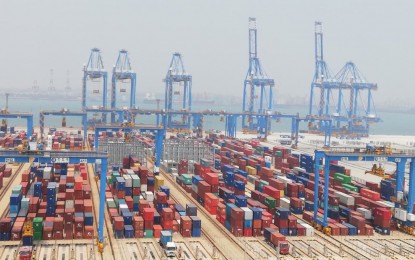
FULLY AUTOMATED. Cargo handling equipment, such as top picks and side picks, line up along the stockpile of thousands of containers in the yard of the Port of Qingdao. The port management has vowed to make a competitive edge in cargo handling business in the world through its fully automated port operations. (PNA photo by John Rey Saavedra)
SHANDONG -- As the Chinese government accelerates its effort to bolster inter-regional cooperation through the Belt and Road Initiative (BRI), the Port of Qingdao in this eastern province in China has committed to making an edge in the world's cargo handling industry through full automation of its port operations.
The port officials presented to 21 journalists and information officers from Asia and Europe the facility's fully automated operations.
The presentation on Friday was part of a seminar organized by the China International Publishing Group (CIPG) based in Beijing and supported by the Ministry of Commerce of the People’s Republic of China and in accordance with the Shandong provincial government's "Tell the Stories of Shandong" program.
Bo Li, port operations manager of Qingdao, underscored the port's milestone in 2018 for handling 19.30 million TEU (twenty-foot equivalent units) due to its advanced automated system.
Placing seventh on the list of busiest ports in the world in 2010, based on the total volume of cargo handled, Qingdao port has perked up the momentum to take the sixth place, Li noted.
“There are three fully automated ports in China. In Qingdao, in Xiamen, and in Shanghai,” he told the Philippine News Agency (PNA) in an interview.
Across the globe, Qingdao’s port management’s full automation is considered as one of the best in the world, he added.
He also noted that other fully automated port operations are found in the US and in Germany.
According to the freight industry website Freight Waves, Qingdao port in the Yellow Sea handled the fifth most volume of containers in China in the first quarter of 2019 with a total volume of 4.94 million TEU.
In a presentation to the 21 journalists and information officers from Afghanistan, Iraq, the Philippines, Turkey, Uzbekistan, Palestine, and Lebanon about Qingdao port’s remote monitoring system through a widescreen, the port officials emphasized that port operations nowadays mean “lesser human contact.”
Stacking and picking operations at the port’s six berth stations up to releasing of cargos from the port yard’s gate is “dehumanized,” it added.
Qingdao port’s two berth station employs nine monitoring staff, instead of the usual 60 personnel employed by most of the conventional international ports around the world.
According to the presentation, job plans for the stacking of containers to and from the international cargo vessels docking at the Port of Qingdao has also been generated through automation.
The port officials also toured the journalists and information officials to the three-story, 60,000-square-meter Qingdao cruise terminal in the city’s port area.
Zhu Yiling, director of the general affairs division of the Information Office of Qingdao’s municipal government, underscored four keywords – “open, model, dynamism, and fashion” -- to explain Qingdao's aspiration as a port city in China’s eastern seaboard, the Yellow Sea.
“As to the first keyword, open, we have many national and international conventions and important events that happened in Qingdao,” Yiling said, mentioning the 2008 Beijing summer Olympics.
It has also hosted the world’s premier sailing competitions, such as the Volvo Ocean Race, the Clipper Round the World Yacht Race, the Extreme Sailing Series, and the ISAF Sailing World Cup in succession. Qingdao is dubbed as a “Sailing City of China” and the “Best Sailing City of Asia”, a briefer Yiling supplied to the visitors said.
“It is also a key city along the New Eurasian Land Bridge Economic Corridor of the Belt and Road Initiative, a pivot city for marine cooperation, and the host city of the 2nd Senior Officials’ Meeting and Ministers Responsible for Trade Meeting of the 2014 APEC, the Civil Society 20 China 2016,” it said.
She said that the keywords "model" and "fashion" refer to the fact that Qingdao has been famous for its brands, such as the China Railway Company and the world-renowned Tsingtao beer, and its state-of-the-art Oriental Movie Metropolis that has a 50 billion yuan investment.
“As to 'dynamism', Qingdao has scientific research in the field of maritime,” she said. “We have a maritime laboratory in Qingdao and that is open for scientists, not only from China but also from the rest of the world.”
Qingdao established trade ties with more than 216 countries and regions across the world, sister-city relationships (with 25 cities) or friendly cooperative relationships (with 48 cities) with 73 overseas cities, and international economic partnerships with 98 cities (provinces/states) or business organizations around the world,” the briefer added.
The city administration projected Qingdao’s population to reach 12 million in 2020. Such figure represents the permanent residents in the downtown area controlled within 6.1 million, with an urban construction area of 660 square km. and an urbanization ratio of more than 78 percent. It recorded a Gross Domestic Product of 1,200.15 billion yuan in 2018. (PNA)
